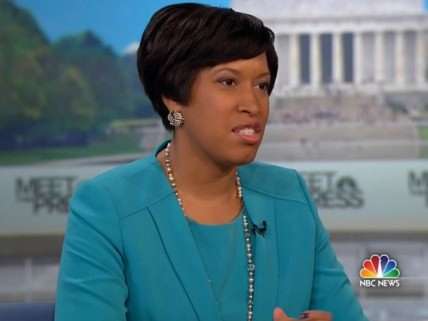D.C. Mayor Agrees That Marijuana Legalization Can Proceed Despite Anti-Drug Rider

In a Meet the Press interview on Sunday, newly elected D.C. Mayor Muriel Bowser joined D.C. congressional delegate Eleanor Holmes Norton, D.C. Council Chairman Phil Mendelson, and D.C. Attorney General Karl Racine in arguing that marijuana legalization in the nation's capital can proceed despite a spending rider that supposedly blocked it. "We want to respect the will of the D.C. voters," she told NBC's Chuck Todd. "We think Initiative 71 was self-enacting. Our legislators are going to send it up to the Congress in January."
Brian Moore, Mendelson's chief of staff, tells me the council chairman "will transmit the measure in the normal course of business," which "will likely be soon." Unless Congress enacts a resolution of disapproval within 30 legislative days of receiving the initiative (which is unlikely), it will take effect automatically, eliminating penalties for possession, sharing, and home cultivation within specified limits.
The main argument for proceeding with congressional review of the ballot measure is that the anti-drug rider in the omnibus spending bill that Congress approved last month bans the use of public funds to "enact" marijuana legalization, and Initiative 71 was enacted when voters approved it in November. That argument seems well-grounded in the language of the D.C. Home Rule Act, but it is not the only way around the rider. Walter Smith, executive director of the D.C. Appleseed Center for Law & Justice, notes that the District kept operating during the last federal government shutdown by drawing on reserve funds appropriated in earlier fiscal years. He argues that the same maneuver could be used to make doubly sure that the District is complying with the anti-drug rider, which applies only to "funds contained in this Act."
The District can say, for example, that the compensation for whatever time Mendelson spends on transmitting Initiative 71 to Congress comes from its reserves. "It's much better," Smith says, "not to simply defy Congress but to say, 'OK, we've read what you've enacted. We're going to abide by it. You told us not to spend our upcoming fiscal-year dollars on this; we won't. We'll spend our reserves.'…That way they have complete authority to implement regulations, pass further legislation if need be, and so on." Smith says that approach might even allow the D.C. Council to proceed with plans to license and regulate marijuana growers and retailers, although "that's a battle for another day."
Editor's Note: As of February 29, 2024, commenting privileges on reason.com posts are limited to Reason Plus subscribers. Past commenters are grandfathered in for a temporary period. Subscribe here to preserve your ability to comment. Your Reason Plus subscription also gives you an ad-free version of reason.com, along with full access to the digital edition and archives of Reason magazine. We request that comments be civil and on-topic. We do not moderate or assume any responsibility for comments, which are owned by the readers who post them. Comments do not represent the views of reason.com or Reason Foundation. We reserve the right to delete any comment and ban commenters for any reason at any time. Comments may only be edited within 5 minutes of posting. Report abuses.
Please to post comments


How much money do they spend *not* arresting low-level pot people?
If you can charge them for more than it costs to kick their door down, they might be losing money in associated fees.
If D.C. voters were deserving of any respect, they wouldn't live in D.C.
Congress shot themselves in the foot on this one.
Who would have thought that a couple of generations of laxly writting legislation and a 'let the courts sort it out' mentality would lead these guys to not picking up on how this bill can be end-run around.
Sounds like a very serious plan to me dude.
http://www.Way-Anon.tk
Wait a moment. If Congress prohibited the use of public funds to enact marijuana legalization, wouldn't that mean that since both Congressional and state Legislature sessions are paid for by public funds, it's now illegal for ANY law-making body to legalize a marijuana?
That would seem to violate the Constitutions of both the United States and the states several different ways.
The DC political class has the (statist) mindset that unless they can write regulations about things like how close you can smoke near a school, or what age groups can possess pot, it isn't legal, only decriminalized.
If that is the "gridlock" position resulting from the Republican Congress attempting to interfere it may have a silver lining.
DC legalized medical marijuana 15 years ago, but the DC government took over a decade to issue permits to anyone to grow or sell it.